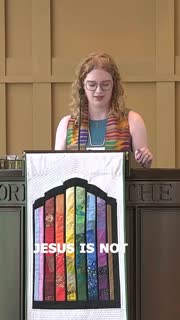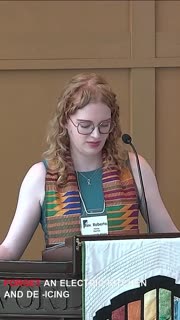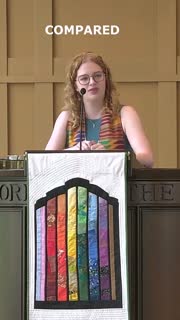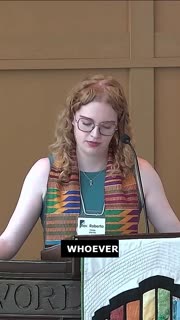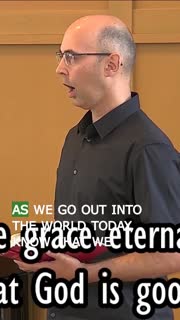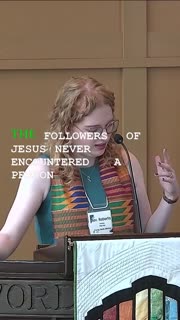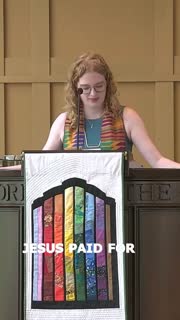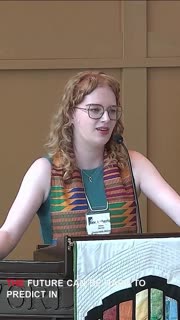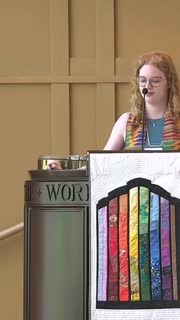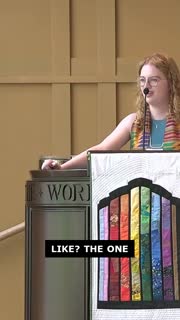Imagining a Radical Future of Inclusion and Justice
Devotional
Sermon Summary
Bible Study Guide
Sermon Clips
### Quotes for Outreach
1. "Jesus is not chastising the people looking for the bread of life when they should be looking for something different. He's telling them they're not thinking big enough. They're thinking logically, yes, rationally, sanely, but not, thinking big enough with what Jesus has as an offer for them. They have access to every miracle that defies logic and physics and reason and history and politics. He can do things that no amount of money can buy. No military power can subdue." [21:24] (44 seconds)
2. "Forget an electric kitchen and de-icing driveways. Go bigger than manna from heaven. Jesus has the miracle for us all ready to go. One where you, I, and everyone in God's creation can find peace and love together. One where we can look back in amazement and wonder at how far we've come and look forward to a future that is not inconceivable, not impossible, but so close we can taste it." [34:15] (37 seconds)
3. "Compared to those centuries ago, we are so close to full equality, equity and justice. I can taste it. manna from heaven. A world where we work for peace. That is what we are doing here right now, and building this Kingdom. It's – we are just one step along that dream. That dream of building the kingdom of heaven together, one brick at a time. This dream is not fact. It is reality. fanciful. It's not delusional. It's not over romantic." [34:15] (48 seconds)
4. "Whoever believes according to Jesus, remember, whoever comes to me will never be hungry. Whoever believes in me will never be thirsty. Whoever takes on his dream, takes on the miracle he is offering to you free of charge, they have eternal life." [34:15] (21 seconds)
5. "As we go out into the world today, know that we are filled with love, courage, and imagination beyond our comprehension. And with that, everything is possible. Go." [52:18] (23 seconds)
### Quotes for Members
1. "The followers of Jesus never encountered a person like Jesus before. One who says that the rules that have been in place and that have counted and have kept order in society no longer matter. No longer apply. This whole class-based system? Toss it out the window. Gender rules that keep men in one spot and women in another spot and forget the non-binary question. That's not the question. Don't ask that. Throw it in the garbage. Worrying about who's hungry and who's not? He will fix that for you. Now think bigger. Even bigger." [30:20] (41 seconds)
2. "Jesus paid for it and liberates us from the tyranny of, but that is the way it was done before. Today is Emancipation Sunday, which many churches will be celebrating as the moment that we mark the abolition of slavery in all, or sorry, the eradication of slavery in the Commonwealth Empire. This was done not just with a snap of fingers and a king who said, you know what, you're right. This was done with hundreds and thousands of people, including the enslaved, those who escaped slavery, activists, white allies from across the world demanding rights and liberty." [32:08] (49 seconds)
3. "The future can be hard to predict in many ways because it requires us thinking so far outside our scope. It requires people from the 40s and 50s imagining that we can do holograms in our living room. It is imagining that we can abolish the role of gender roles in our lives. It is imagining that we can abolish racism. That is incredibly difficult." [28:26] (26 seconds)
4. "They have access to something that could defy everything. Everything in this world. And they want him to repeat the bread and fish of yesterday because it was comfortable and reassuring. No, for Jesus, he wants them to break free of those limitations." [23:15] (20 seconds)
5. "What would that ideal future look like? The one that you can look back on or the one that you could look forward to with a smile on your face. No limit in money. No limit in politics. No limit in science. No limit in yourself. Is it that we do not need to worry about racism, period, or ableism, because people of all disabilities are able to be part of a community in whatever capacity they could be in. Is that that gender roles are not defined by someone else, but you deciding what your role in your relationship is." [28:26] (43 seconds)
Ask a question about this sermon
1. "Jesus is not chastising the people looking for the bread of life when they should be looking for something different. He's telling them they're not thinking big enough. They're thinking logically, yes, rationally, sanely, but not, thinking big enough with what Jesus has as an offer for them. They have access to every miracle that defies logic and physics and reason and history and politics. He can do things that no amount of money can buy. No military power can subdue." [21:24] (44 seconds)
2. "Forget an electric kitchen and de-icing driveways. Go bigger than manna from heaven. Jesus has the miracle for us all ready to go. One where you, I, and everyone in God's creation can find peace and love together. One where we can look back in amazement and wonder at how far we've come and look forward to a future that is not inconceivable, not impossible, but so close we can taste it." [34:15] (37 seconds)
3. "Compared to those centuries ago, we are so close to full equality, equity and justice. I can taste it. manna from heaven. A world where we work for peace. That is what we are doing here right now, and building this Kingdom. It's – we are just one step along that dream. That dream of building the kingdom of heaven together, one brick at a time. This dream is not fact. It is reality. fanciful. It's not delusional. It's not over romantic." [34:15] (48 seconds)
4. "Whoever believes according to Jesus, remember, whoever comes to me will never be hungry. Whoever believes in me will never be thirsty. Whoever takes on his dream, takes on the miracle he is offering to you free of charge, they have eternal life." [34:15] (21 seconds)
5. "As we go out into the world today, know that we are filled with love, courage, and imagination beyond our comprehension. And with that, everything is possible. Go." [52:18] (23 seconds)
### Quotes for Members
1. "The followers of Jesus never encountered a person like Jesus before. One who says that the rules that have been in place and that have counted and have kept order in society no longer matter. No longer apply. This whole class-based system? Toss it out the window. Gender rules that keep men in one spot and women in another spot and forget the non-binary question. That's not the question. Don't ask that. Throw it in the garbage. Worrying about who's hungry and who's not? He will fix that for you. Now think bigger. Even bigger." [30:20] (41 seconds)
2. "Jesus paid for it and liberates us from the tyranny of, but that is the way it was done before. Today is Emancipation Sunday, which many churches will be celebrating as the moment that we mark the abolition of slavery in all, or sorry, the eradication of slavery in the Commonwealth Empire. This was done not just with a snap of fingers and a king who said, you know what, you're right. This was done with hundreds and thousands of people, including the enslaved, those who escaped slavery, activists, white allies from across the world demanding rights and liberty." [32:08] (49 seconds)
3. "The future can be hard to predict in many ways because it requires us thinking so far outside our scope. It requires people from the 40s and 50s imagining that we can do holograms in our living room. It is imagining that we can abolish the role of gender roles in our lives. It is imagining that we can abolish racism. That is incredibly difficult." [28:26] (26 seconds)
4. "They have access to something that could defy everything. Everything in this world. And they want him to repeat the bread and fish of yesterday because it was comfortable and reassuring. No, for Jesus, he wants them to break free of those limitations." [23:15] (20 seconds)
5. "What would that ideal future look like? The one that you can look back on or the one that you could look forward to with a smile on your face. No limit in money. No limit in politics. No limit in science. No limit in yourself. Is it that we do not need to worry about racism, period, or ableism, because people of all disabilities are able to be part of a community in whatever capacity they could be in. Is that that gender roles are not defined by someone else, but you deciding what your role in your relationship is." [28:26] (43 seconds)
